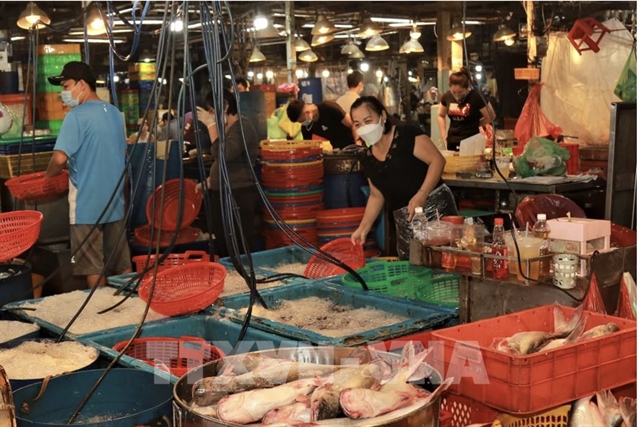 Society
Society

 |
| A live seafood shop in Bình Điền wholesale market in HCM City. VNA/VNS Photo |
HCM CITY – The work of ensuring food safety during Tết (Lunar New Year holidays) has been tightened in HCM City recently so people can enjoy the festive season safely.
Tết is the time of high demand for food consumption, thus concerns about risk of unhygienic and unsafe food are also raised.
At 8pm every day, when trucks carrying goods begin to line up to the stores in Bình Điền Wholesale Market in District 8, staff of Food Safety Management Team No. 10 (under the HCM City Department of Food Safety) start their working day.
Along with visual observation and checking invoices and documents, the staff also take quick test samples.
The closer it is to the Lunar New Year, the more food and groceries arrive at the market, and the more hours of work they do each night, as well as a greater number of rapid tests.
Nguyễn Văn Sắc, the team’s leader, said that the team has been strengthening inspection of all agricultural products entering the market. “Along with visual and sensory inspection, we have continuously done quick tests to check for impurities in seafood products such as borax concentration, hydrogen peroxide and other chemical substances,” Sắc said.
“Some high-risk products such as pre-processed vegetables and fruits, grated water spinach, bamboo shoots and lotus roots must be guaranteed not to be bleached or have weight inflated by soaking, and if chemical additives are used, they must be within the allowable limits with clear documents,” he said.
“Meat products must be clearly traceable and have a slaughter control mark to enter the market," he said.
Similarly, Food Safety Management Team No. 9 in charge of Hóc Môn Wholesale Market has mobilised all of its staff to monitor food coming in and out in the days leading up to Tết.
According to Nguyễn Văn Hòa, the team’s leader, the average amount of pork arriving at the market each night is nearly 400 tonnes, equivalent to 5,100 pigs.
As the amount of meat arriving at the market increases by 30 per cent, food control is also stricter, said Hòa.
Pork and beef to the market must be fresh, with identification bracelets and having clear origins, be slaughtered in legal slaughterhouses, and be inspected by veterinarians in accordance with regulations, he said.
Phạm Khánh Phong Lan, director of the city’s Food Safety Department, said that every day, the three large wholesale markets of Bình Điền, Thủ Đức and Hóc Môn supply about 80 per cent of local people's needs.
Near Tết, due to increased demand, the amount of food arriving at the markets also increased by about 30-50 per cent, she said.
“Therefore, ensuring food safety at these markets is always a priority. The department has arranged three teams of food safety management at the three markets to ensure that food entering and leaving the market is always monitored and inspected,” Lan said.
“Our policy is to ensure the highest safety at wholesale markets because food from here will be sold in every corner of the city.
“If safety from these markets cannot be guaranteed, the risk of people consuming unsafe food is higher."
Since the end last year, the department has established teams to inspect warehouses storing raw materials such as meat and fresh goods to serve the production and processing of food for Tết.
By early this year, the teams focus on inspections at the stages of distribution and supply of goods.
According to the director, during the peak inspection period for the New Year of Dragon, the agency detected a number of violations.
The department will give stricter sanctions such as suspending operations and revoking licences, and transfer to investigation agencies to propose prosecution for food production and business establishments that commit serious and recurring violations, she said.
At the same time, the unit will publicise violations of organisations and individuals producing and trading foods on mass media to promptly warn producers, businesses and the community.
“Initially, it can be seen that the compliance with food hygiene and safety of food production facilities in the city is relatively good. The department will continue to conduct planned and unscheduled inspections to promptly detect and handle violations during the Tết peak period," she added.
Although inspection activities have not recorded any serious violations of food safety, the department’s head is still concerned about illegally trading food on sidewalks and roadways.
Besides, the explosion of e-commerce and online food business also poses a potential risk of unhygienic food.
Lan recommended that people buy food in reputable and certified establishments and shops that have been inspected and monitored, because buying and using unsafe food can lead to poisoning, and in the long term, toxic substances can accumulate and cause negative health consequences.
Lan urged people to call the department’s hotline when detecting acts that violate the law on food safety or encountering unsafe practices. VNS




